★★½
“As the crane flies.”
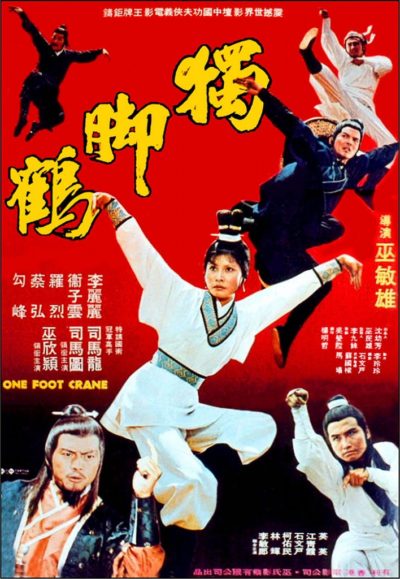 We begin with the murder of a family, with the sole (apparent) survivor being a small child, Fung Lin-yi (Li), who is able to escape. Rescued by – and stop me if you’ve heard this one before – a kung-fu master, she is rigourously trained in the titular style of martial arts. It’s fairly nifty, not least for the dagger hidden in the tip of her shoe which she uses to administer the coup de grace, Rosa Klebb style. Fifteen years later, she’s ready to seek revenge on the quartet of outlaws responsible for killing her family, who unlike our heroine, appear not to have aged a day over the decade and a half since they participated in the slaughter. Matters are complicated by a few factors. Her first victim is the father of one of the outlaws, who then starts tracking down the mysterious “One Foot Crane” responsible. There’s also a police official investigating the situation (Sze), and it turns out Lin-yi may not be the only survivor after all (Wei).
We begin with the murder of a family, with the sole (apparent) survivor being a small child, Fung Lin-yi (Li), who is able to escape. Rescued by – and stop me if you’ve heard this one before – a kung-fu master, she is rigourously trained in the titular style of martial arts. It’s fairly nifty, not least for the dagger hidden in the tip of her shoe which she uses to administer the coup de grace, Rosa Klebb style. Fifteen years later, she’s ready to seek revenge on the quartet of outlaws responsible for killing her family, who unlike our heroine, appear not to have aged a day over the decade and a half since they participated in the slaughter. Matters are complicated by a few factors. Her first victim is the father of one of the outlaws, who then starts tracking down the mysterious “One Foot Crane” responsible. There’s also a police official investigating the situation (Sze), and it turns out Lin-yi may not be the only survivor after all (Wei).
Plenty going on here, for sure, though not much of it is particularly of interest. Indeed, from an action heroine point of view, it leads to a dilution of focus, with the movie’s attention being pulled in too many different directions. It ends up doing none of them justice and sidelining Lin-yi, just as things should be getting going. Li isn’t bad, either in performance or with her fists and feet; there’s just nothing particularly special about either facet of her character. It does form an interesting contrast to the recently reviewed Eight Strikes of the Wildcat in one area. That had the heroine taking on three villains for the film’s climax, and this approach makes for a much stronger and more impressive finale than the one here, where she needs the help of two others (using eagle and mantis techniques) in order to take on the final boss. You never saw Bruce Lee or Jackie Chan requiring assistance.
Veteran Hong Kong star Lo Lieh shows up, though despite his high presence in the movie’s opening credits, his contribution should probably be more in the “with…” or “and…” categories, if the makers were being honest. He appears only briefly as a villain, swinging a blade on a chain around. I did appreciate the way the film didn’t subject us to the almost contractually required training montage: one second, Lin-yi is a little girl doing kung-fu, and a cut later, she’s all grown-up and doing kung-fu. However, there is almost nothing else which sticks in my mind, and I finished watching it a scant few hours ago. Still, Li clearly must have had some skills, enjoying a long career in both film and television, appearing as recently as 2020. She was the lead in a 1978 TV series of The Bride with White Hair, and received a “Long-term Service and Outstanding Employee Honour Award” from TVB for thirty years’ service in 2018. This, however, doesn’t merit any further discussion.
Dir: Wu Min-hsiung
Star: Lily Li, Wei Tzu-Yun, Tsai Hung, Sze Ma Lung





 After her truck-driving husband is injured in an attempted hijack, Sweetiepie (Darby) finds herself in a bind. They’re way behind on payments for the truck, to the point that it’s about to be repossessed by C.W. Douglas (Stanton) of Vehicle Retrievals Incorporated. In desperation, she hires experienced driver Flatbed Annie (Potts) to partner with her, working the necessary delivery routes to pay off their debt. However, Douglas is not the only threat the pair face on the highway. The failed hijack was intended to recover a package which has surreptitiously been placed in the truck during a run to Mexico, and its owners remain very keen to recover their merchandise from the new operators,
After her truck-driving husband is injured in an attempted hijack, Sweetiepie (Darby) finds herself in a bind. They’re way behind on payments for the truck, to the point that it’s about to be repossessed by C.W. Douglas (Stanton) of Vehicle Retrievals Incorporated. In desperation, she hires experienced driver Flatbed Annie (Potts) to partner with her, working the necessary delivery routes to pay off their debt. However, Douglas is not the only threat the pair face on the highway. The failed hijack was intended to recover a package which has surreptitiously been placed in the truck during a run to Mexico, and its owners remain very keen to recover their merchandise from the new operators, The first thing which will hit you about this 1979 Taiwanese co-production is the utterly shameless way it hijacks John Williams’s soundtrack to Star Wars. 93 minutes later, as the end credits roll, accompanied by more unauthorized liftage… That’s probably still going to be the main element of this you will remember. For the rest is largely a confusingly-plotted and not very well executed bit of chop socky. Despite Angela Mao’s presence, second on the list of participants, she is a long way behind the main character, in terms of both screen time and action.
The first thing which will hit you about this 1979 Taiwanese co-production is the utterly shameless way it hijacks John Williams’s soundtrack to Star Wars. 93 minutes later, as the end credits roll, accompanied by more unauthorized liftage… That’s probably still going to be the main element of this you will remember. For the rest is largely a confusingly-plotted and not very well executed bit of chop socky. Despite Angela Mao’s presence, second on the list of participants, she is a long way behind the main character, in terms of both screen time and action.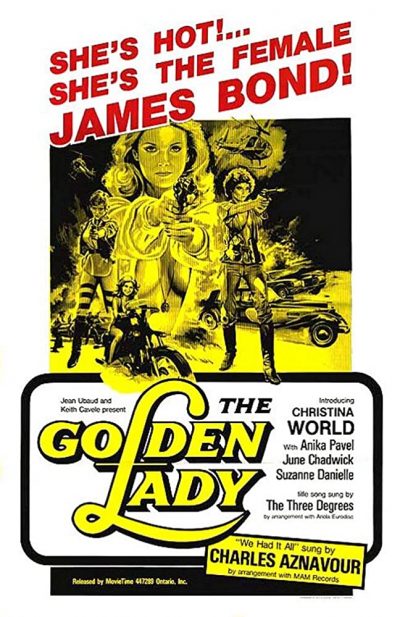 This British film occupies an odd middle ground between Ian Fleming and Jackie Collins – with a garnish of… The Village People? Yeah, there were points where I genuinely wondered what I’d strayed into. The titular female is Julia Hemingway (Skriver, under the rather laughable screen name of “Christina World”, which seems more like a dubious theme-park), who is a corporate espionage specialist. She accepts a commission to infiltrate the bidding for oil rights in a Middle Eastern country, on behalf of one of the four participants.
This British film occupies an odd middle ground between Ian Fleming and Jackie Collins – with a garnish of… The Village People? Yeah, there were points where I genuinely wondered what I’d strayed into. The titular female is Julia Hemingway (Skriver, under the rather laughable screen name of “Christina World”, which seems more like a dubious theme-park), who is a corporate espionage specialist. She accepts a commission to infiltrate the bidding for oil rights in a Middle Eastern country, on behalf of one of the four participants.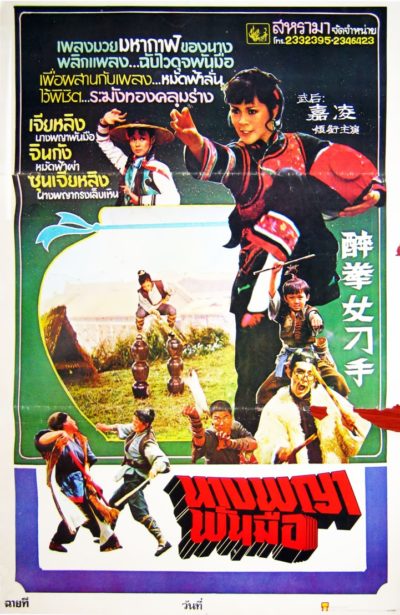 In this late era Judy Lee film, she stars as the confusingly-named Brother Blind, a name which scores only 50% for accuracy. She is indeed, largely unable to see, the result of a confrontation with the motley group of bandits who killed her father (Sit). Though even here, there is some confusion as to whether there are 13 of them, as an alternate title suggest, or 14 as the English dub mentions on several occasions. They’re certainly a random bunch, some of who are missing limbs or fingers, as well as two “giants” who aren’t very tall, and a “poison dwarf” who wields a blow-gun, responsible for Brother Blind losing her sight.
In this late era Judy Lee film, she stars as the confusingly-named Brother Blind, a name which scores only 50% for accuracy. She is indeed, largely unable to see, the result of a confrontation with the motley group of bandits who killed her father (Sit). Though even here, there is some confusion as to whether there are 13 of them, as an alternate title suggest, or 14 as the English dub mentions on several occasions. They’re certainly a random bunch, some of who are missing limbs or fingers, as well as two “giants” who aren’t very tall, and a “poison dwarf” who wields a blow-gun, responsible for Brother Blind losing her sight. And Frankenstein Created Woman? That might have been an alternate title, with German scientist Dr. Serafin (Jurgens) in the role of the creator – he’s a man with a dubious past, and whispers of involvement in Nazi experimentation. Now “rehabilitated” to the US, in what may be a medical version of Operation Paper Clip, he uses an unholy mix of pharmaceuticals and extreme training methods to convert his own daughter, Goldine, into a 6’2″ athletic superwoman, with the aim of completing an unheard of triple crown at the upcoming Moscow Olympics, winning the 100, 200 and 400 metre gold medals. To fund this work, he brings in a consortium of businessmen who aim to capitalize on Goldine’s success with advertising, merchandising, etc. Brought in to advise them, as Goldine is prepared for her first public events, is agent Jack Dryden (Coburn), who gradually realizes the one person not wholeheartedly committed to the entire proceedings, is the runner herself.
And Frankenstein Created Woman? That might have been an alternate title, with German scientist Dr. Serafin (Jurgens) in the role of the creator – he’s a man with a dubious past, and whispers of involvement in Nazi experimentation. Now “rehabilitated” to the US, in what may be a medical version of Operation Paper Clip, he uses an unholy mix of pharmaceuticals and extreme training methods to convert his own daughter, Goldine, into a 6’2″ athletic superwoman, with the aim of completing an unheard of triple crown at the upcoming Moscow Olympics, winning the 100, 200 and 400 metre gold medals. To fund this work, he brings in a consortium of businessmen who aim to capitalize on Goldine’s success with advertising, merchandising, etc. Brought in to advise them, as Goldine is prepared for her first public events, is agent Jack Dryden (Coburn), who gradually realizes the one person not wholeheartedly committed to the entire proceedings, is the runner herself.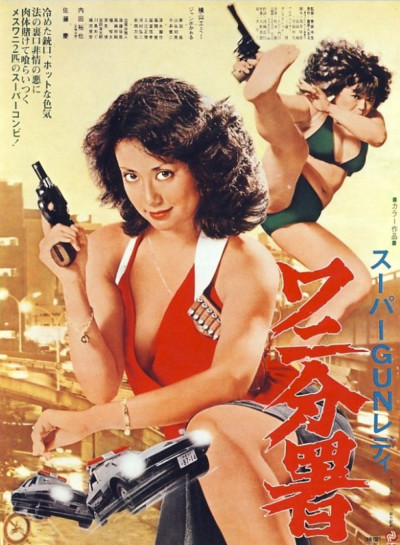
 After her brother is severely beaten by a drug dealer, Las Vegas lounge singer (!) Michelle Wilson (Kiger, Miss January 1977) is visited by his teacher (Cole), who knows the location of the cartel’s drug warehouse. Wilson puts together a team of women who have reason to want to take the dealers down, including a stuntwoman (Anderson) and an undercover cop (Grant). There’s also a martial-arts instructress, a model and, tagging along, one of the teacher’s pupils. They build a heavily-armed van, train in the ways of war, and rip off a bunch of militia types for weaponry, before staging a successful raid that destroys the warehouse. However, the mob (led by veteran actors Peter Lawford and Jack Palance) are not prepared to let them get away with it.
After her brother is severely beaten by a drug dealer, Las Vegas lounge singer (!) Michelle Wilson (Kiger, Miss January 1977) is visited by his teacher (Cole), who knows the location of the cartel’s drug warehouse. Wilson puts together a team of women who have reason to want to take the dealers down, including a stuntwoman (Anderson) and an undercover cop (Grant). There’s also a martial-arts instructress, a model and, tagging along, one of the teacher’s pupils. They build a heavily-armed van, train in the ways of war, and rip off a bunch of militia types for weaponry, before staging a successful raid that destroys the warehouse. However, the mob (led by veteran actors Peter Lawford and Jack Palance) are not prepared to let them get away with it. ★★★★
★★★★ Mark (Lemaire), is a thief on the run from his collaborators after absconding with the loot. He takes refuge in a remote country manor, all but surrounded by water, which he believes to be deserted. Turns out he was almost right. The sole inhabitants are a pair of chambermaids, Eva (Lahaie) and Elizabeth (Mai), but despite his gun, they don’t seem quite as terrified of the intruder as one feels they should be, and tell him they are expecting some other female visitors later that evening. Elizabeth does take a shine to Mark, and tells him he should leave, but Eva uses her wiles to keep Mark there. The rest of his gang show up, and lay siege to the house, but Eva takes the loot out to them and single-handedly dispatches them, before returning to the manor. As night descends, the visitors finally arrive, and the noose tightens around Mark’s neck, as the truth about the get-together is revealed…
Mark (Lemaire), is a thief on the run from his collaborators after absconding with the loot. He takes refuge in a remote country manor, all but surrounded by water, which he believes to be deserted. Turns out he was almost right. The sole inhabitants are a pair of chambermaids, Eva (Lahaie) and Elizabeth (Mai), but despite his gun, they don’t seem quite as terrified of the intruder as one feels they should be, and tell him they are expecting some other female visitors later that evening. Elizabeth does take a shine to Mark, and tells him he should leave, but Eva uses her wiles to keep Mark there. The rest of his gang show up, and lay siege to the house, but Eva takes the loot out to them and single-handedly dispatches them, before returning to the manor. As night descends, the visitors finally arrive, and the noose tightens around Mark’s neck, as the truth about the get-together is revealed…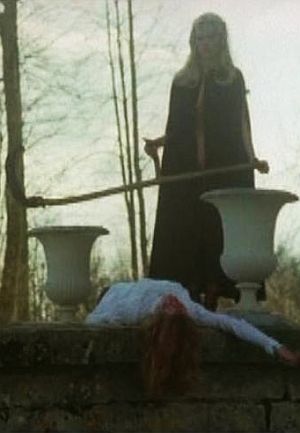 Watching porn stars try to act is often a painful experience, but renowned 70’s XXX starlet Lahaie is perfectly cast here. She plays a feral creature, driven entirely by instinct, and with no qualms about using sex or violence to achieve her aim, of keeping Mark in the house for the night. The sight of her stalking across the bridge which forms the castle’s sole entrance, wielding a blood-stained scythe almost the same size as the actress, is one that will stick with you. The film does betray its cheapness with some fairly crappy effects [you’re going to have someone hacked apart with a scythe, you should do better than some red gunk on the throat], but more than makes up for it with a parade of strong, confident and sensual female characters. Mark is by no means an idiot or a weakling, but from the moment he arrives in the house, it’s clear he’s completely beyond his depth, out-maneouvered at every turn by the women.
Watching porn stars try to act is often a painful experience, but renowned 70’s XXX starlet Lahaie is perfectly cast here. She plays a feral creature, driven entirely by instinct, and with no qualms about using sex or violence to achieve her aim, of keeping Mark in the house for the night. The sight of her stalking across the bridge which forms the castle’s sole entrance, wielding a blood-stained scythe almost the same size as the actress, is one that will stick with you. The film does betray its cheapness with some fairly crappy effects [you’re going to have someone hacked apart with a scythe, you should do better than some red gunk on the throat], but more than makes up for it with a parade of strong, confident and sensual female characters. Mark is by no means an idiot or a weakling, but from the moment he arrives in the house, it’s clear he’s completely beyond his depth, out-maneouvered at every turn by the women.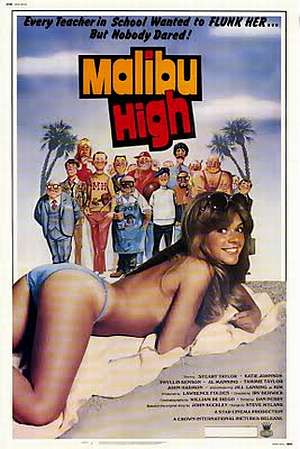 This one popped out of nowhere, on a box-set of discs called Drive-In Cult Classics: most of these were unremarkable double-feature fillers, and this started off looking the same way, Kim (Lansing) is fed up with life: she’s still in high-school at age 18, is about to flunk it, has no money, just lost her boyfriend (Taylor), her father hung himself and her mom’s a total bitch. Finally, she opts to use her natural resources (if you know what I mean, and I think you do) to resolve these issues – though when her mother suggested Kim get a job, I’m not sure she meant as a whore working in the back of a VW van for the ultra-sleazy Tony (Mann). Her ‘popularity’ there lets her move up to work for the slightly-less sleazy Lance (Howard). Which is where the film takes an abrupt right turn, as she discovers a taste for killing – not least on her former pimp – and starts work as, to use one of the movie’s alternate titles, a high-school hit girl.
This one popped out of nowhere, on a box-set of discs called Drive-In Cult Classics: most of these were unremarkable double-feature fillers, and this started off looking the same way, Kim (Lansing) is fed up with life: she’s still in high-school at age 18, is about to flunk it, has no money, just lost her boyfriend (Taylor), her father hung himself and her mom’s a total bitch. Finally, she opts to use her natural resources (if you know what I mean, and I think you do) to resolve these issues – though when her mother suggested Kim get a job, I’m not sure she meant as a whore working in the back of a VW van for the ultra-sleazy Tony (Mann). Her ‘popularity’ there lets her move up to work for the slightly-less sleazy Lance (Howard). Which is where the film takes an abrupt right turn, as she discovers a taste for killing – not least on her former pimp – and starts work as, to use one of the movie’s alternate titles, a high-school hit girl.